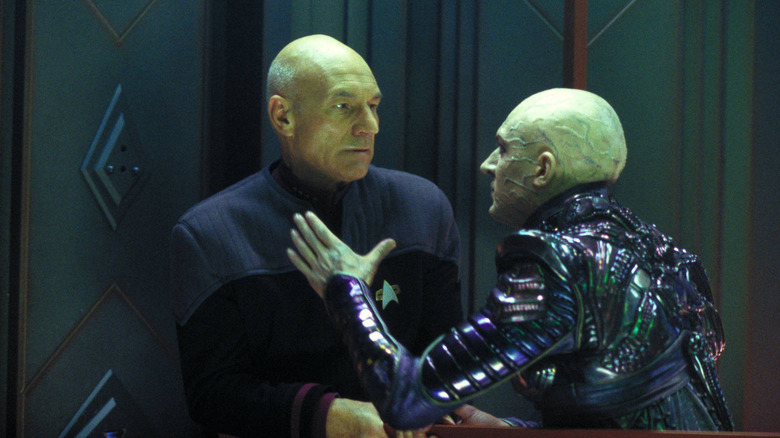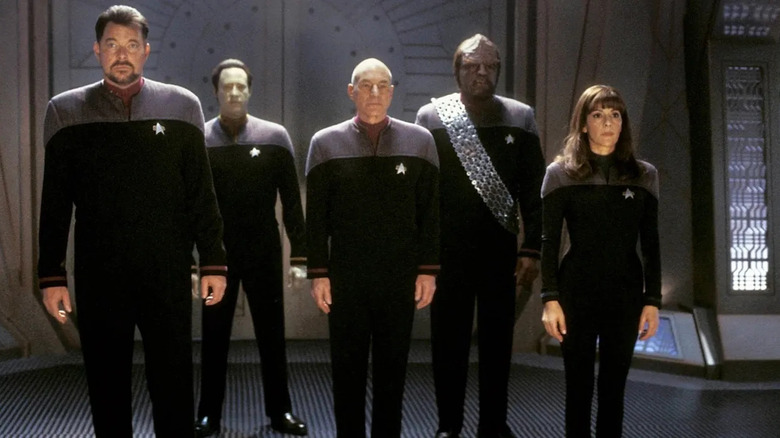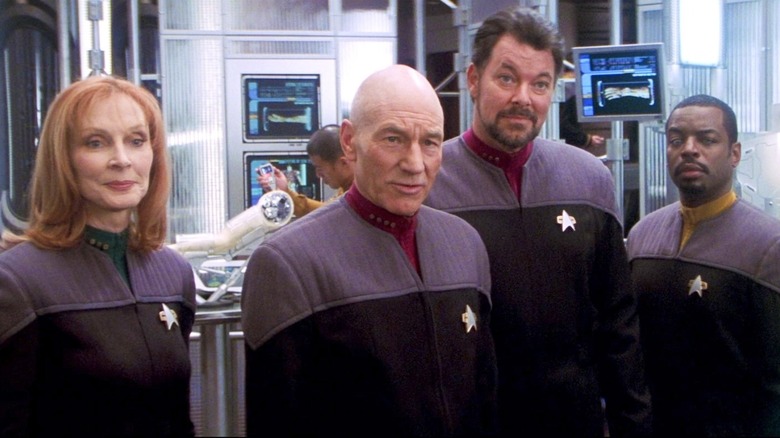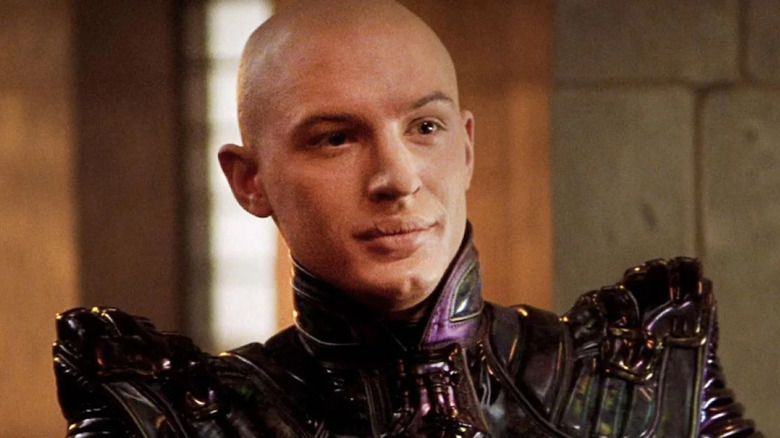What Went Wrong With Star Trek: Nemesis, According To Jonathan Frakes
I have vivid memories of seeing "Star Trek: Nemesis" on December 13, 2002 (the film's opening day) and learning what true pop culture disappointment felt like. "Star Trek" had been a part of my life and my home for as long as I could remember. Even lesser "Star Trek" was still "Star Trek." But "Nemesis" was different. It was bad in unique ways. It was bad in ways that didn't feel like "Star Trek." My life as a movie and TV fan, as a "Star Trek" fan, hinges on that day. The day I learned that the things I loved could actively hurt me. There are worse films out there, yes, but few carry the profound stench of disappointment quite like this one, a film that took one of the greatest casts of characters in science fiction history and gave them a conclusion so half-assed that it felt like a personal insult.
These days, everyone agrees that "Star Trek: Nemesis" is a bad movie, and that includes the people who made it. And if you ask "Trek" franchise actor and director Jonathan Frakes, he has a few explanations for why the film doesn't work at all. One of them involves its failure to embrace the film's veteran cast of beloved characters. The other is a bit more blunt.
Our favorite space uncle chimes in
Frakes is, of course, the actor behind everyone's favorite Space Uncle, Commander William Riker, on "Star Trek: The Next Generation." He's also a prolific "Trek" director. In addition to his work directing dozens of episodes of "The Next Generation" and other "Star Trek" shows, he helmed two of the "Next Generation" feature films — the well-regarded "Star Trek: First Contact" and the lesser but largely harmless "Star Trek: Insurrection." If there's anyone who can diagnose what went wrong with "Nemesis," it's the man who, honestly, should've been the first choice to direct it considering his years of experience and proven track record.
In the invaluable two-volume oral history book "The Fifty-Year Mission" by Edward Gross and Mark A. Altman, Frakes gets candid about "Nemesis." As he notes, the production seemingly had everything: a respected screenwriter, a rising star (baby Tom Hardy!) as the villainous Shinzon, a crew audiences loved to pieces. Everything except respect for the characters:
"With 'Nemesis' it was as if the Fates stepped in. We had John Logan, who's an A-list writer. We had what was a great company back together again. Tom Hardy was a brilliant guest star. My take on it, though, was that there was not enough of the family. It was a little too much of Shinzon and not enough of Picard and Data. The first weekend people came to see Bones, Kirk, and Spock, or Picard and Data, you know what I mean? The story of 'Nemesis' was very much a story about the obsession of Shinzon, Tom Hardy's character. The front end of the movie with the wedding of Riker and Troi, and which was so charming, just got cut to bits. We originally had [returning actors] Whoopi [Goldberg] and Wil Wheaton and all of these Easter eggs in there, and Brent [Spiner] sang. It was a big deal that got cut up to nothing."
And then there's director Stuart Baird.
'The director was an idiot'
I vividly recall a portion of the press cycle for "Star Trek: Nemesis" revolving around director Stuart Baird being a total newcomer to "Star Trek," as if that was a selling point. And you can tell he doesn't care when you watch the actual movie. Rules of the "Star Trek" universe are casually flouted. Beloved characters are treated as props, their histories forgotten. And Frakes insisted that this wasn't due to lack of trying on his part. Although Frakes himself was not invited back to direct the fourth "Next Generation" movie, he says he reached out and tried to do his due diligence:
"It didn't help that Stuart Baird was trying to reinvent the wheel, but I don't think you can blame the director for Nemesis' fate. At the same time, I remember calling him and saying, 'If there's anything I can do to help you, I've been around these people for all these years.' And I think in the same phone call I said, 'We're really here to help. You'll find that we're a very strong team and we know how to do this and we're really happy to help make the best movie you can.' And he didn't pick up either of those offers. In retrospect, it seems like arrogance. Why wouldn't you accept that kind of offer?"
Another "Next Generation" vet, Marina Sirtis, who plays Counsellor Deanna Troi, was more blunt: "The director was an idiot."
All good things...
In his defense, Stuart Baird isn't an idiot. He just wasn't the right fit for a "Star Trek" movie in any way whatsoever, and his hiring was a typically epic miscalculation from "Trek" producer Rick Berman. He was a capable action filmmaker, with "Star Trek: Nemesis" being his third film after "Executive Decision" and "U.S. Marshals," but his lack of investment in the "Trek" universe is evident from frame one. Audiences could tell, too. "Nemesis" was the first "Trek" film to bomb at the box office, grossing $67 million worldwide against a $60 million budget. It ushered in on the great dark ages of "Star Trek" fandom, and it took JJ Abrams' splashy, big-budget 2009 reboot to bring the franchise back from the dead.
Although he never directed another movie, Baird has done fine for himself. He returned to his career as an acclaimed, in-demand editor, taking on major films both terrific ("Casino Royale" and "Skyfall") and terrible ("Green Lantern"). He'll always be the man who edited Richard Donner's "Superman" and "Lethal Weapon," even if "Nemesis" hangs around his neck like an albatross.
Meanwhile, the cast of "The Next Generation" got their proper due with season 3 of the streaming series "Star Trek: Picard," which reunited the crew for a nostalgia-fueled final voyage. It doesn't erase the existence of "Star Trek: Nemesis," but it backgrounds it. It's no longer the bitterly disappointing final adventure of a beloved crew. It's now just a speed bump on the way to the conclusion they actually deserve.



